Key takeaways:
- Festival competitions foster a sense of community and shared creativity, enriching both participants and audiences through diverse artistic expressions.
- Preparation is crucial; understanding guidelines, refining work through feedback, and practicing presentations enhance performance quality and confidence.
- Building connections with fellow participants can lead to valuable collaborations and unforeseen opportunities, enriching the overall artistic journey.
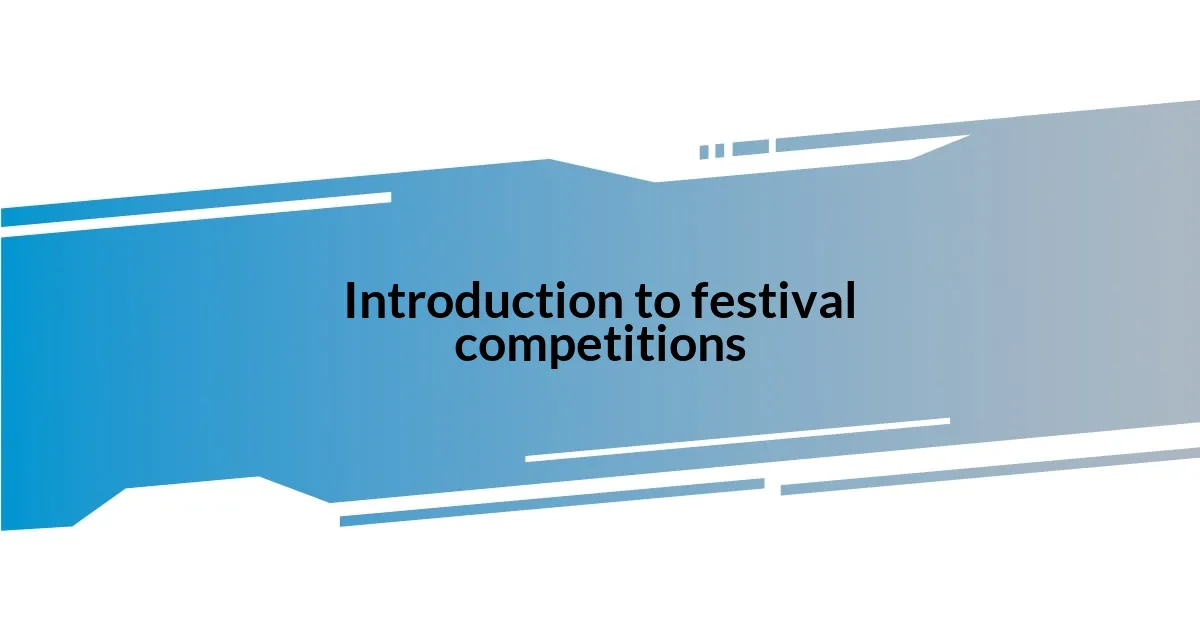
Introduction to festival competitions
Festival competitions are vibrant celebrations where talent meets passion, creating an electrifying atmosphere. I still remember my first experience at a local arts festival; the thrill of participating while surrounded by creativity was utterly exhilarating. Each participant brings their unique flair, making the competition not just a test of skill but a showcase of diverse artistic expressions.
As I think back to that day, I realize how festival competitions can evoke a wide range of emotions, from excitement to anxiety. Have you ever felt the rush of anticipation just before stepping onto a stage? That feeling of butterflies in your stomach, coupled with the hope of sharing your art with an audience, is something truly special. These events often foster a sense of community, as artists and spectators alike come together to celebrate their shared love for creativity.
Exploring festival competitions reveals a world where hard work and artistry intertwine. I have met so many talented individuals who pour their heart into their craft, and being part of this energetic environment is both humbling and inspiring. It’s a reminder that, beyond the competitive edge, these festivals are about connection, growth, and perhaps most importantly, the sheer joy of creative expression.
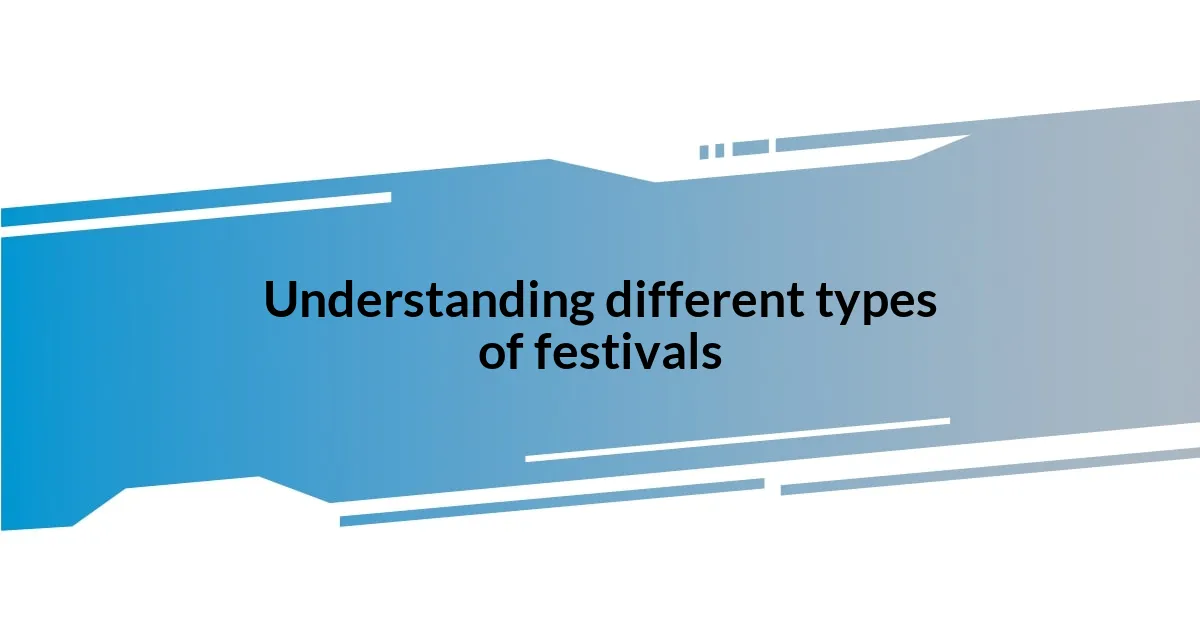
Understanding different types of festivals
Understanding different types of festivals can be a fascinating journey. From cultural celebrations to music events, each festival offers a distinct flavor and purpose. I remember attending a cultural festival in my hometown where every booth was bursting with colors, aromas, and sounds that celebrated our heritage. It was a vibrant reminder of how festivals serve not just as entertainment, but as a way to unite communities and honor traditions.
Here’s a quick overview of some common types of festivals you might encounter:
- Cultural Festivals: Celebrate traditions, art, and heritage, often featuring performances and local cuisine.
- Music Festivals: Focus on live performances, showcasing various genres and attracting audiences from diverse backgrounds.
- Food Festivals: Highlight culinary delights, providing a platform for chefs to share dishes and explore different cuisines.
- Arts Festivals: Emphasize visual and performing arts, allowing artists to display their talents and connect with audiences.
- Religious Festivals: Commemorate significant spiritual events, often involving rituals, ceremonies, and communal gatherings.
These experiences stay with me long after the events have ended, offering not just memories but profound insights into the world around us. Festivals have the remarkable ability to create a sense of belonging, something I truly cherish in this ever-evolving society.
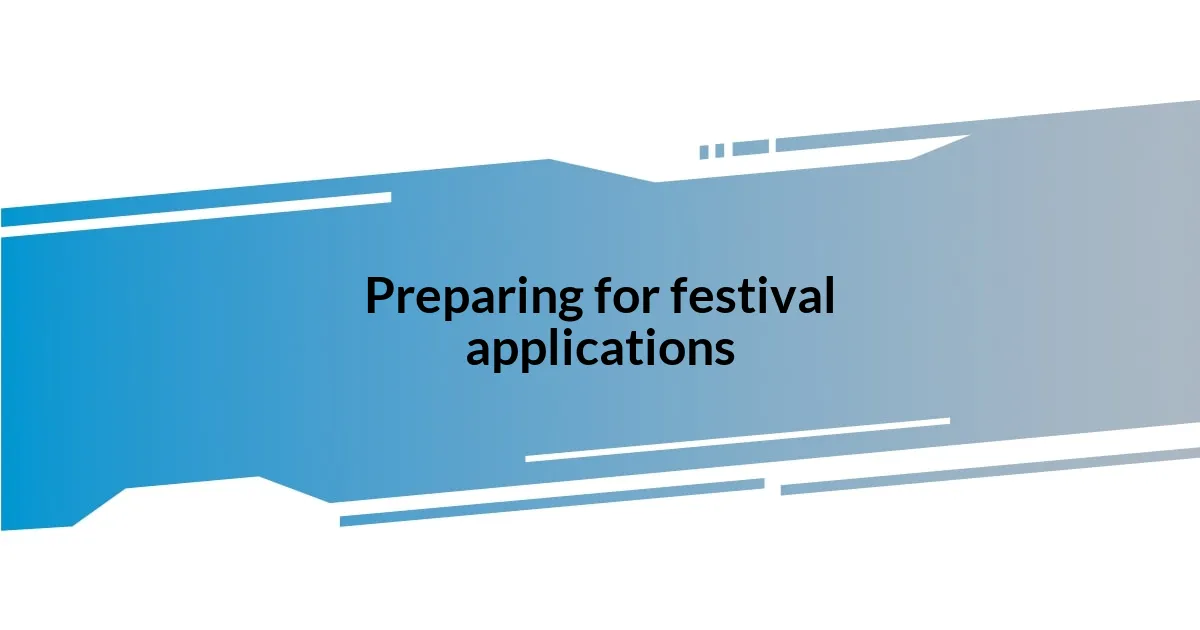
Preparing for festival applications
As I began preparing for festival applications, I realized the importance of establishing a strong foundation. I always start by carefully reviewing the guidelines for each festival. It’s common for different competitions to have varied requirements, and attention to detail is crucial. One time, I almost missed the deadline because I overlooked specific instructions. So, I’ve learned to create a checklist to stay organized and focused on the essentials, ensuring nothing slips through the cracks.
After understanding the requirements, I shift my focus to refining my work. I remember a particular festival where I submitted a piece that I felt was complete. But during the preparation phase, I made a point to take a step back and evaluate my work critically. I reached out to a few trusted friends for feedback, which led to valuable insights. Their fresh perspectives opened my eyes to improvements I hadn’t considered before.
Lastly, I suggest practicing your presentation or performance. There’s a unique energy that comes from sharing your art, and practice helps harness that energy. I still recall rehearsing for my first festival; I was nervous, but with each run, I became more comfortable. This preparation not only boosts confidence but transforms anxiety into passion when facing the stage.
| Preparation Steps | Insights |
|---|---|
| Review Guidelines | Ensures understanding of requirements and avoids mistakes. |
| Refine Work | Incorporating feedback significantly enhances the quality of submissions. |
| Practice Presentation | Boosts confidence and transforms nervous energy into engaging performances. |
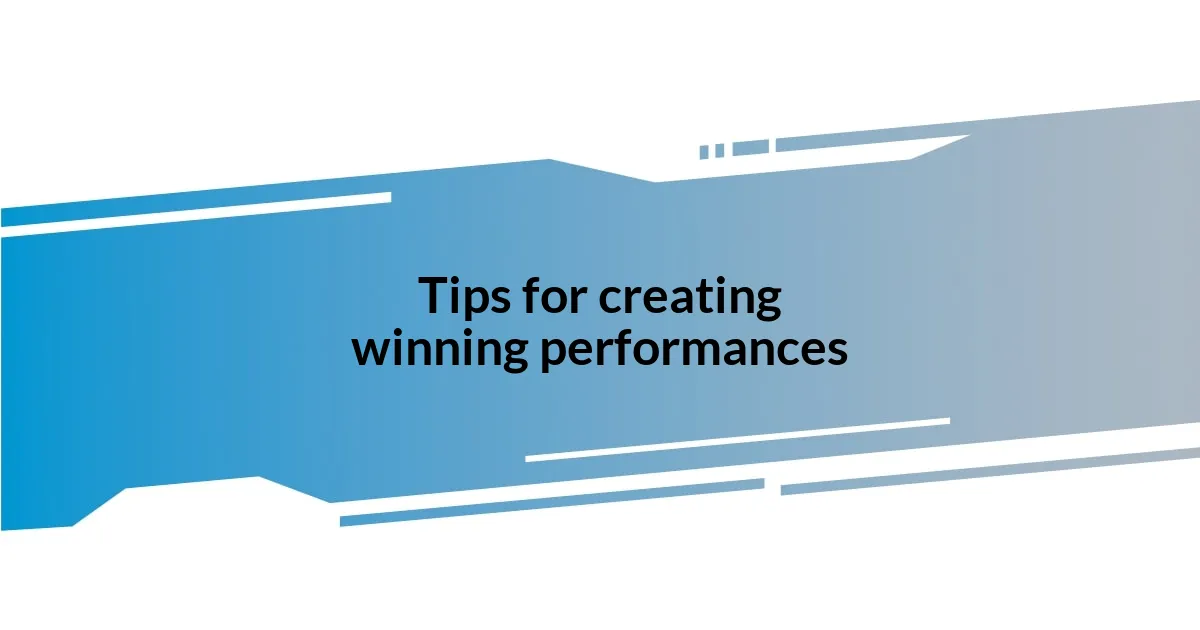
Tips for creating winning performances
Creating a winning performance begins with understanding your audience. I recall once at a music festival, I changed my setlist after noticing the crowd’s energy—it was an instinctive decision that transformed my performance. When you connect with the audience’s vibe, everything feels more fluid and electric. Have you ever felt that kind of energy? It’s exhilarating, and it can elevate your performance from good to unforgettable.
Another crucial tip is to infuse your unique personality into your act. I remember performing a routine that was technically sound but lacked my personal touch. After seeking feedback, I decided to add a few elements that reflected my character—quirky humor and relatable stories. Suddenly, my performance felt authentic. I realized that when you embrace who you are, it resonates with the audience and creates a memorable experience.
Lastly, don’t underestimate the power of storytelling in your performance. I once watched a dancer captivate the audience not just with movements, but with a narrative that tied her choreography together. It made each step meaningful and engaging. I’ve learned that a compelling story can create an emotional connection, leaving the audience wanting more. Have you considered how your performance tells a story? Crafting that narrative might just be the secret ingredient to crafting an unforgettable showcase.
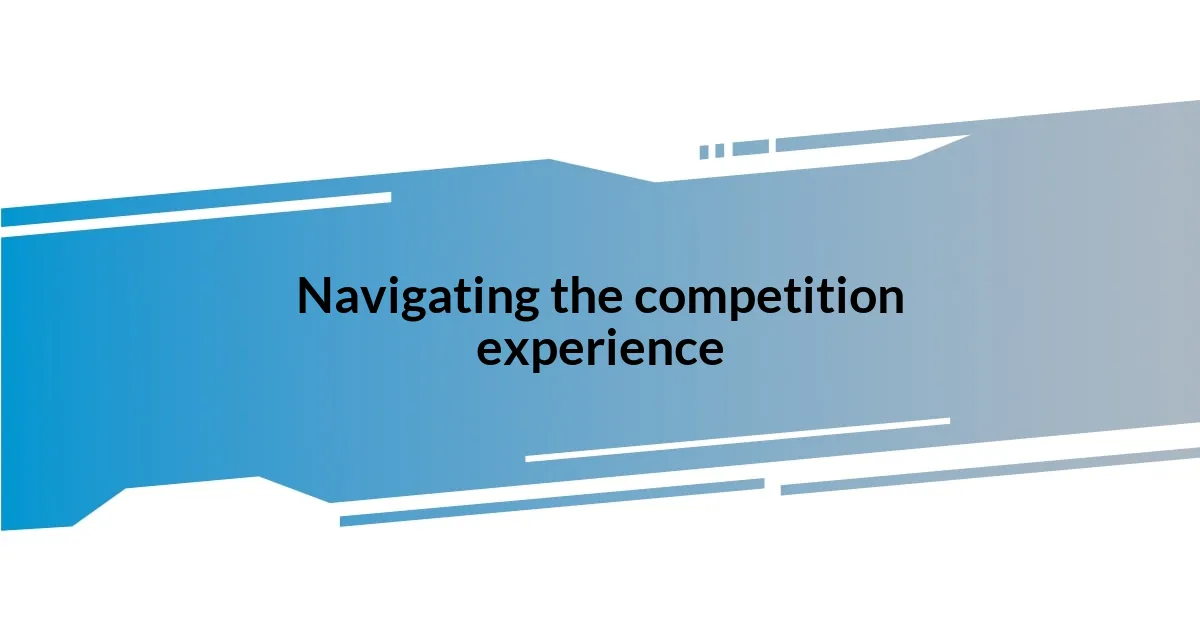
Navigating the competition experience
Navigating the competition experience can be an exhilarating yet daunting journey. I remember my first competition vividly; the energy was electric, but I felt like a fish out of water. One key lesson I’ve learned is the importance of community, as connecting with fellow competitors can provide unexpected support. Have you ever bonded with someone and found a collaborative spirit that uplifted you? Those connections can lighten the weight of competition.
Once you’ve settled into the atmosphere, the next step is to focus on your mindset. I found that staying present is crucial, especially when nerves kick in. I still practice deep breathing techniques that help keep me grounded. There was a moment during a tense performance when I almost lost my focus, but breathing through it brought clarity and allowed me to connect with my art again. What techniques do you use to center yourself?
Lastly, embracing feedback can redefine your experience. In one competition, I received critiques that stung at first, but I chose to view them as stepping stones rather than barriers. This mindset shift opened my eyes to areas I could improve. Have you ever left a competition wondering how to grow? Learning to approach feedback with an open heart has transformed my journey and deepened my love for the craft.
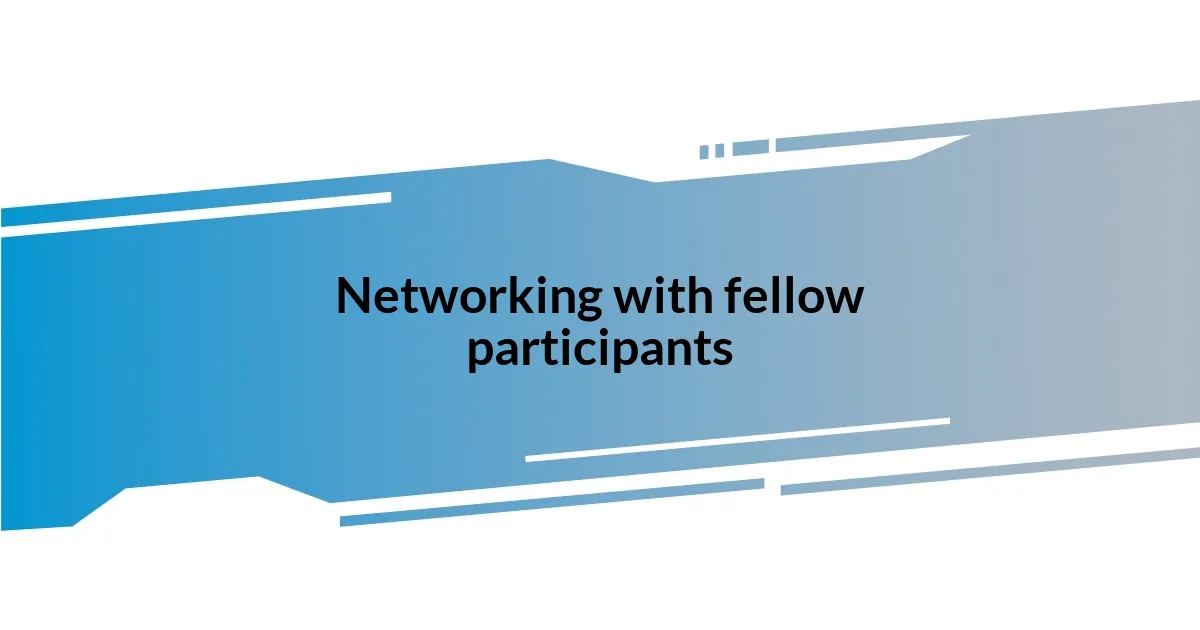
Networking with fellow participants
Building connections with fellow participants has been one of the most rewarding aspects of my journey through festival competitions. I still recall an unforgettable evening after a long day of performances when a group of us gathered around a fire pit. We shared stories of our experiences, triumphs, and challenges. It felt like finding a family away from home, and those moments reinforced the idea that competition doesn’t have to be solitary; it can be a shared adventure. How often do we overlook the power of camaraderie in a competitive setting?
The friendships that sprout in these environments can enrich your entire experience. I remember striking up a spontaneous collaboration with a dancer I met during a workshop. Our styles were different yet complementary, and blending them created something new and exciting! This not only broadened my creative horizon but also made me realize how these interactions can lead to innovation. Have you ever thought about how collaboration can elevate your artistic journey?
Moreover, networking with other participants often opens doors that you might not have considered. After one competition, a fellow musician introduced me to a local venue that was looking for fresh talent. That connection turned into a regular gig, shifting my career trajectory. It made me wonder—what opportunities might be waiting just outside your comfort zone? Embracing these connections can lead to unforeseen paths that enrich both your craft and your life.
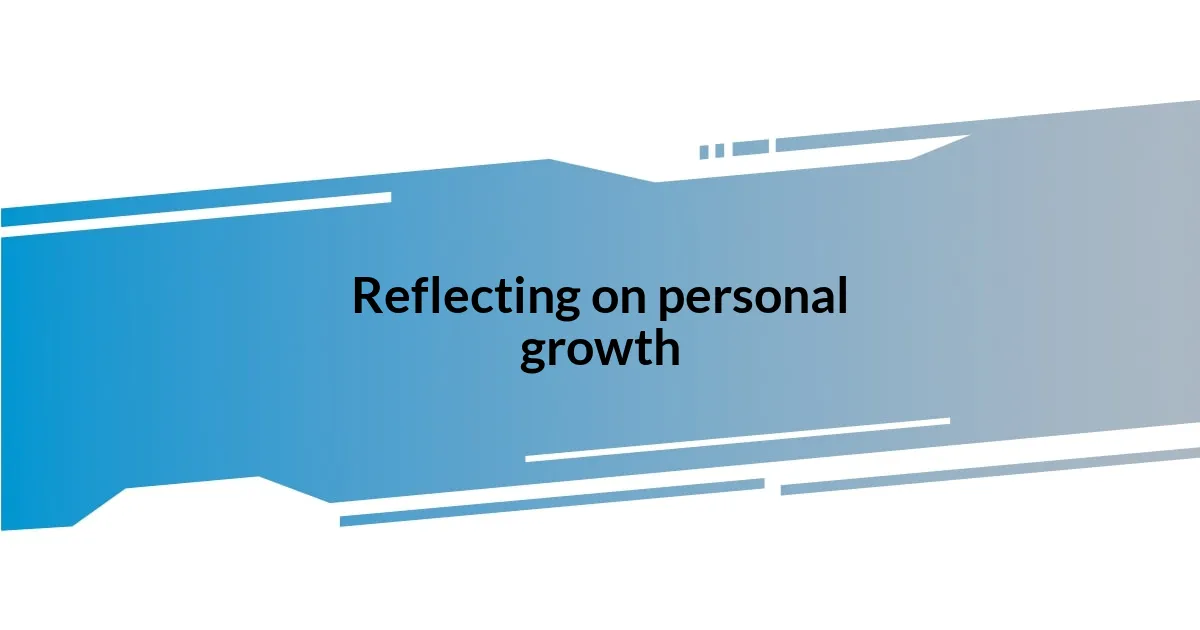
Reflecting on personal growth
Reflecting on my personal growth through festival competitions has been a transformative experience. I still recall the moments of self-doubt that crept in before performances, making me question my abilities. It wasn’t until I faced those fears head-on—standing in front of an audience with my heart racing—that I discovered the strength I never knew I had. Have you ever surprised yourself by pushing through a challenge you thought was insurmountable?
Each competition taught me not only about my craft but also about resilience and adaptability. There was a time when I completely flubbed a routine, and while I felt crushed in the moment, I realized it was an opportunity to learn. I took a step back and analyzed what went wrong. This introspection helped me approach my next performance with renewed focus and determination. Do you find that setbacks can sometimes catalyze your growth in unexpected ways?
In those reflections, I gained a clearer understanding of my artistic voice. It was in the quiet moments after a contest, reviewing my performances with a critical yet loving eye, that I began to recognize my unique style. Now, I use each experience as a building block rather than a stumbling block. Isn’t it fascinating how our journeys can shape the artists we become and reveal depths of creativity we never knew existed?
